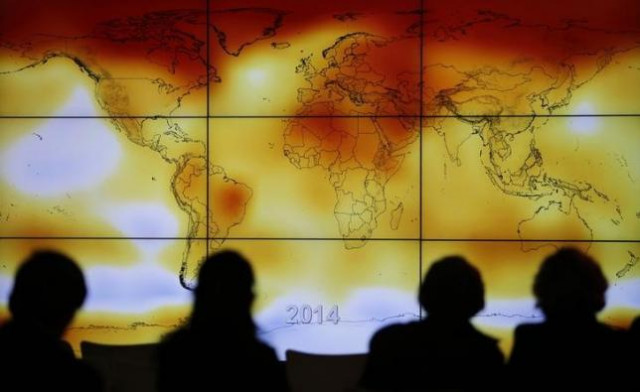Translating policies into practice: Numerous climate change challenges await new govt
Experts say there is dire need for introducing proper checks on pollution creators

Participants looks at a screen projecting a world map with climate anomalies during the World Climate Change Conference 2015. PHOTO: REUTERS
With Malik Amin Aslam nominated as the next climate change minister in the list of the 21-member incoming cabinet outlined by the Pakistan Tehreek-e-Insaf (PTI) had been recently chosen to sit at the high-level International Advisory Council for the Eco-Forum Global- a leading environmental think tank advising the government of China. Health experts termed Aslam’s nomination as climate change minister a good omen for the country, because of his knowledge and understanding about climate change issues and challenges faced by the country.
They said that amid global warming, the country was facing asymmetric rain patterns, apart from long dry spells. The situation is exacerbated by a lack of coordination between concerned government departments and non-implementation of adaptation and mitigation policies at the public and private level.
They anticipated that the country will remain vulnerable to climate change impacts. Environmentalists, however, say that the current Ministry of Climate Change (MoCC) has thus far failed to take tangible steps to implement the programme efficiently.
The outgoing Pakistan Muslim League-Nawaz (PML-N) government had approved the climate change bill in November 2016 which paved the way for the Pakistan Climate Change Council responsible for implementing the Kyoto Protocol and the Paris agreements.
Despite the fact that the council is a senior climate change decision-making body — which is either to be chaired by the prime minister or a person nominated by him — it has yet to meet.
Moreover, the National Climate Change Policy Implementation Committee (NCCPIC) could not take solid steps to influence the provinces, ministries and divisions in making medium or long-term plans for adaptation measures to tackle with climate change issues under the National Climate Change Policy (NCCP).
Environmentalists say that there is a dire need for introducing proper checks on industrial and other forms of pollution. The new government would have to chalk out a clear strategy to meet these challenges. Another climate change issue is the Glacial Lake Outburst Flood (GLOF) and depleting water resources coupled with shrinking forest cover, unregulated and rampant use of genetically modified (GMO) seeds without gauging their impacts on local environment besides of social and economic impacts.
Environmentalists believe that Aslam’s predecessor Mushahiduallh Khan, despite his best efforts, could not translate policies into practical actions even though numerous environmental issues had been pushed into the limelight during his tenure.
Published in The Express Tribune, August 20th, 2018.



















COMMENTS
Comments are moderated and generally will be posted if they are on-topic and not abusive.
For more information, please see our Comments FAQ